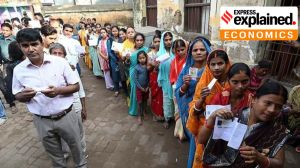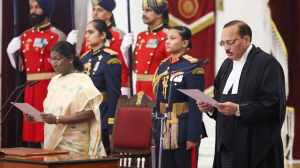Death of a survivor
Over the last five months, three figures who had left their stamp on the politics of the Congress party have made their exit from the poli...

Over the last five months, three figures who had left their stamp on the politics of the Congress party have made their exit from the political scene, each in differing ways. Rajesh Pilot, the charismatic MP from Dausa and the man whom many regarded as a potential leader of the party, met with a fatal road accident in June. Last fortnight, the JMM case verdict with its jail sentence, left former prime minister Narasimha Rao wrestling with court procedures. On Wednesday, death claimed octogenarian Sitaram Kesri, the erstwhile Seva Dal activist who went on to preside over the fortunes of the party at a particularly crucial period in its history.
Of the three, it was Kesri who arguably best represented the archetypal Congressman, not just in his sartorial preferences which included the mandatory topi duly starched but in his political philosophy.It was a willingness to kowtow to those who mattered, a complete submission of the ego to will of the puppeteer, that helped fuel the rise of this otherwise unexceptional politician from Bihar within the party. The lingering image of the Kesri topi, placed strategically at the feet of Indira Gandhi on one occasion, best encapsulates this uncompromising servility. It had its compensations. Mrs Gandhi, who was clever about divining loyalty in her minions, rewarded Kesri by making him party treasurer, a sensitive post and one he held for decades.
It is a testimony to this outstanding commitment to the party and its leaders that not once in all those years of safeguarding the monies flowing into the party kitty was Kesri accused of personal corruption. Indeed, if the progeny of other politicians in power often miraculously prospered, Kesri’s family left behind in distant Danapur witnessed no great alteration in its circumstances. However, his success as the party treasurer underlined the fact that his strength really lay in backroom, not grassroots, strategising. In his 60-odd years of public life, he won only one Lok Sabha election and there even came a time, in the dying moments of his party presidentship, when Congress candidates standing for elections made sure that Kesri did them the favour of not campaigning for them.
Yet, while the urban and urbane may have been contemptuous of this seeming rustic, with his piquant turn of phrase most famously his deployment of the word, nikkamma, to describe then prime minister, H.D. Deve Gowda Kesri, had sound social instincts. He realised the importance of expanding the social base of the party to include the OBC vote, and it was fortuitous that as a minister of social welfare in the Rao cabinet he could even lay claim to having implemented the Mandal Report. That the party was not very successful in bringing this dimension into its politics despite Kesri’s best efforts partly explains the fractured electoral verdicts it has had to contend with. Similarly, Kesri did not belong to the school within the Congress that believed in making its compromises with Hindutva, as an ugly altercation he had with the RSS showed. Yet, ironically, he remained at his party’s helm during a period that saw the forces representing both Mandal and Hindutva on the ascendancy. Neither the Congress norChacha could withstand them. That was Kesri’s personal tragedy and that of his party.



- 01
- 02
- 03
- 04
- 05




























